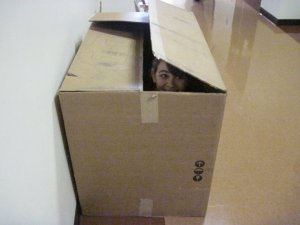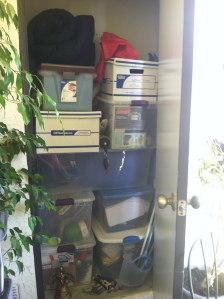
College students often live in boxes. Or out of boxes. Whatever.
Okay today is going to be a fun one because I got to go through Facebook and find lots of college pictures of me being homeless.
Last week I read an intriguing post on Raptitude entitled “How much of your life are you selling off?” It really appealed to me because 1) I think money is a big government conspiracy and 2) I can’t seem to figure out how I spend so much of it. If you didn’t read the post, it basically talks about how we are quite literally selling our souls. We work and save around 10% of our paychecks so that someday we can retire, by which time we have spend the majority of our good health and time working. The post introduces a novel concept in our “American Dream” society where, rather than working our whole lives so we can have the $1 million or so dollars we need to retire, spending less, saving more, and retiring before our lives have passed us by.
The key here is to live on less. I got to thinking about college when I read this. In college, well, I was essentially homeless for about the first 3 years. I technically “lived” with my parents, however I spent so much time studying, researching, and working 3 jobs that I ended up sleeping in my $300 minivan, camping out at the beach with my textbooks, or just not sleeping and staying up all night in the chemistry student lounge and hiding from security when they tried to kick me out.



At this point in my life I was very capable of living on little. Even while living in an apartment with $800 rent and

A professor actually stopped and gave me change as I was sitting on the ground of the science building.
spending $500 a week on gas, I kept all of my expenses from exceeding $1500 a month. I had to. Internships and tutoring only pay so well. I borrowed my textbooks from the library, barely ate out, never spent more than $10 on clothes, and only spent $20 a week on groceries. And I wasn’t living off a diet of Ramen (although I didn’t have a whole lot of variety). I discovered that you could get a lot of really decent food for less at Trader Joe’s.
Somehow, upon graduating college and securing decent employment, my expenses ballooned. Yes, I was paying student loans so that added about $400, but I reduced my rent to $550 and a smaller car and fewer places to be reduced my gas expenses from $500 to $120. Technically I should have been spending way less than I was in college. But since I could afford it my tastes got more expensive. Growlers full of craft beer, sushi dinners, massages, a cushy gym membership, clothes. My expenses started to top $2600 a month, over $1000 more than I was paying as a college student. Had my expenses stayed at their college levels, I would have around $25,000 saved by now, nearly enough to be free of my student loan debt.
Now that I am (not so patiently) awaiting my return to school in 2 months and 6 days, I’ve re-assessed my spending. I’m going to have zero income, living only off the money I have saved. Starting this month I am flipping the switch back to college-student-broke mentality and perhaps this time I will keep it that way.



 Today I read a
Today I read a 

![IMG_0603[1]](https://myminimalistwedding.files.wordpress.com/2013/06/img_06031.jpg?w=224&h=300)







